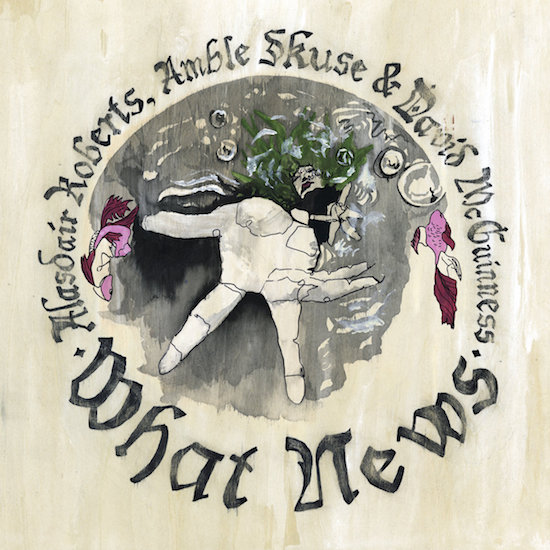Alasdair Roberts follows an ancient and modern path of his own devising: he conjures up a deep past through his entirely new songs. Once in a while he also records an album of traditional songs – like What News, a set of sinister and bleak murder ballads rendered with haunting beauty and experimental musicianship.
And increasingly, Roberts is engaged in collaboration. The albums that made his name in the early days of the 2000s folk revival involved just himself, his guitar and a selection of highly literate, urgent songs. He sounded like an eternal chronicler, older than any of the stories he told. More recently, he has combined his own, fruitful remaking of Scots myth with shared albums – A Wonder Working Stone credited to Alasdair Roberts & Friends, Hirta Songs with Robin Robertson, and now What News with David McGuinness and Amble Skuse.
The songs on What News include several familiar from Roberts’ performances as a constantly touring musician: ‘The Fair Flower of Northumberland’, ‘’The Dun Broon Bride’, ‘Young Johnstone’, ‘Babylon’. Usually accompanied by his own unmistakable acoustic guitar, the song are remade here by Roberts’ decision to leave the instrumentation to his companions and just sing. David McGuinness is an early music keyboardist. He plays carefully chosen instruments, including a 1844 grand piano and, from 1920s Glasgow, a dulcitone – a keyboard instrument that plays tuning forks. These very particular sounds create a percussive baseline that is a departure from Roberts’ previous style. But that’s not all. Amble Skuse is also involved, and she is a ‘sonologist’, a term that usually describes the study of the perceptions of sound. In her case, it encapsulates interactive, responsive electronic music, and she adds unexpected, sometimes astonishing layers to the more conventional singing and playing of Roberts and McGuinness.
‘The Dun Broon Bride’ opens with a distant drilling sound, and something like a nearby typewriter clattering around the core rhythm of the song, which is then picked up on a jaunty piano. The layered instrumentation gives the song heft and depth, but it’s still a surprise when a electric guitar solo kicks in, as though Roberts has been hanging out with Trembling Bells between sessions (which he probably has). Then it is gone again, chased away by the typewriter. The lament rolls to its inevitable, disastrous ending, with the mixture of sound effects, classical and traditional musicianship disconcerting and fascinating. On ‘Johnny O’ The Brine’, McGuinness’s piano rolls out an irresistible dance of death, beautifully complementing Roberts’ high strong clear voice. The soundscape of ‘The Fair Flower of Northumberland’ opens out as the title character crosses the border into Scotland, with birdsong in the trees and a choir echoing in a far cloister. Throughout ‘Long-a-Growing’ a gentle rain comes and goes, as though the song was being recorded out in the open on the fells.
The songs on What News are both familiar and brutal – stories of murder for love, murder for jealousy, suicide following murder in error or, in a best case scenario, rejection by a lover who turns out to be married with children. The combination of Roberts, McGuinness and Skuse brings a new presence to these hard tales of mistreated women, and a confident Scottish identity to the album. There is nothing comfortable about these traditions, but the evident joy in each other’s skills pushes the three musicians to peaks of subtle innovation. What News is just the latest in a string of Alasdair Roberts albums which turn our idea of folk music upside down and give it back to us charged with a new potency.


